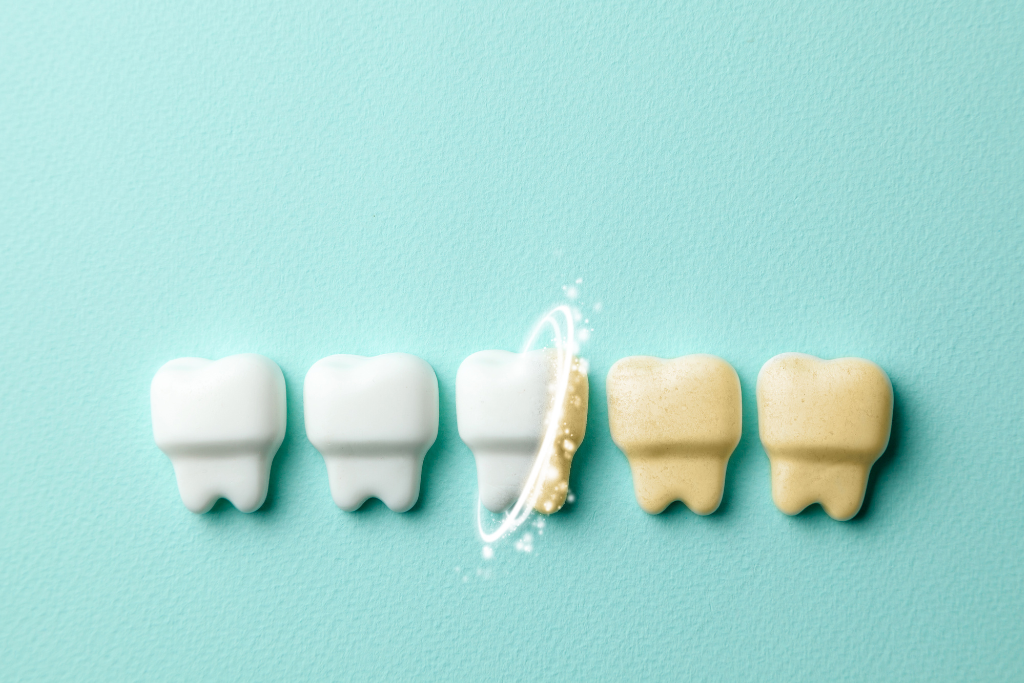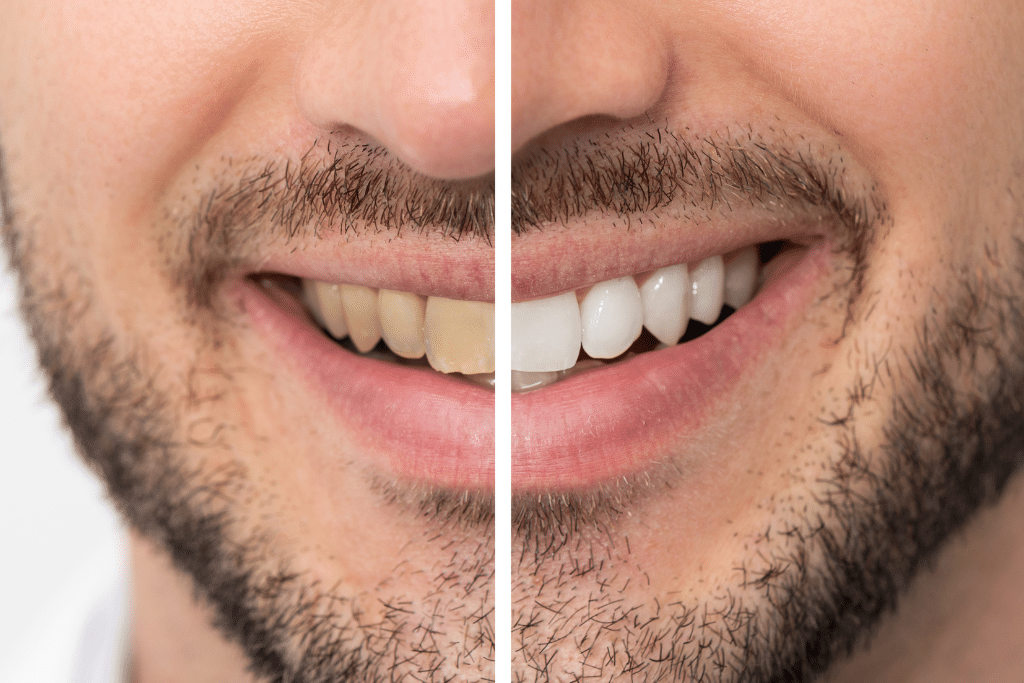Yellow teeth are a problem that affects everyone. We all try our best, but sometimes, it seems like no matter what we do, our smile isn’t as bright as we want it to be. Many factors, including diet, oral habits and genetics, can cause teeth discolouration. This guide will cover the causes of yellow teeth, how to prevent and reduce staining and treatments such as teeth whitening for a whiter smile. By knowing these, you can get and maintain a healthier smile.
Tooth Enamel and Tooth Discolouration
To understand why teeth turn yellow, we need to understand tooth enamel. Tooth enamel is the hard outer layer of teeth; it protects the inner layers from damage and decay. It also plays a big role in tooth colour. Healthy enamel is white, but as it wears down over time due to many factors, it can reveal the underlying dentin layer. The dentin layer is naturally yellow, which can contribute to the overall yellow colour of teeth.
What causes teeth to go yellow?
Poor Oral Habits
One of the main causes of yellow teeth is poor oral hygiene. Not brushing and flossing regularly can lead to plaque buildup, which not only causes tooth decay but also yellow stains. Plaque is a sticky film of bacteria that forms on teeth and can harden into tartar if not removed regularly. This tartar buildup can make teeth look yellow or even brown.
Diet Choice
The foods and drinks you consume can affect the colour of your teeth. Some are notorious for staining teeth, including:
- Red Wine: Red wine’s deep red colour and acidity can stain.
- Acidic Foods: Fruits like citrus and tomatoes can erode tooth enamel, making it more prone to staining.
- Certain Fruit Enzymes: Berries have pigments that can stain teeth.
Does smoking make teeth yellow?
Smoking and chewing tobacco can give you a lovely shade of yellow teeth, whether you call it “tooth discolouration” in the UK or “tooth discoloration” in the US. Either way, your dentist might not be too happy. Tar and nicotine in tobacco can make teeth yellow or brown over time. Chewing tobacco can also cause more localised staining where the tobacco is held in the mouth.
Additional Factors
While poor oral habits, diet choices, and smoking are major contributors to yellow teeth, other factors can play a role:
- Ageing: As you age, the enamel on your teeth wears down, revealing the yellowish dentin beneath.
- Genetics: Some people naturally have thicker or more opaque enamel, which can affect how their teeth look.
- Medications: Certain medications, like tetracycline antibiotics, can cause tooth discolouration,
especially in children whose teeth are still developing.
Intrinsic vs Extrinsic Stains
To address tooth discolouration, we need to differentiate between intrinsic and extrinsic stains:
- Intrinsic Stains: These stains are within the tooth and are caused by factors like too much fluoride during tooth growth, certain medications or trauma to the tooth.
- Extrinsic Stains: These surface stains are caused by external factors like food, drink and tobacco.
How do I get rid of the yellow on my teeth?
Good Oral Habits
Good oral habits are key to preventing yellow teeth. Here’s how:
- Brushing: Brush your teeth at least twice a day with whitening toothpaste. An electric toothbrush can be more effective in removing plaque and stains.
- Flossing: Floss daily to remove food particles and plaque between your teeth.
- Regular Dental Visits: Visit your dentist regularly for professional cleanings and check-ups to keep your teeth fit and healthy.
Diet Modifications
Your diet can affect the colour of your teeth. Here’s what to do:
- Limit Staining Foods and Drinks: Reduce your consumption of red wine, coffee, tea and other staining foods and drinks.
- Eat Teeth Friendly Foods: Apples, carrots and celery can clean your teeth and promote dental health.
Home Remedies for Whiter Teeth
Several home remedies can help you get a whiter smile. These are less effective than professional treatments but can be a good starting point. We always recommend consulting with your dentist before trying these techniques.
Baking Soda
Baking soda is a mild abrasive that can remove surface stains from your teeth. Mix a small amount of baking soda with water to form a paste, and brush your teeth once or twice a week.
Activated Charcoal
Activated charcoal absorbs toxins and stains. You can use activated charcoal toothpaste or make your paste by mixing activated charcoal powder with water. Brush your teeth gently with this paste once a week.
Apple Cider Vinegar
Apple cider vinegar has whitening properties. To use it, dilute a small amount with water and swish it around your mouth for a few minutes before brushing your teeth. Use this sparingly to avoid damaging your enamel.
Coconut Oil Pulling
Coconut oil pulling involves swishing a tablespoon around your mouth for 15-20 minutes. This can remove plaque and bacteria and give you a whiter smile. Try oil pulling a few times a week for best results.
Professional Teeth Whitening Options
For more dramatic results, consider professional teeth whitening treatments. These can give you a noticeable difference in your tooth colour.
Over-the-Counter Products
Whitening Toothpaste
Whitening toothpaste contains mild abrasives and chemicals that can remove stains. Popular whitening toothpaste often contains hydrogen peroxide or carbamide peroxide. Use this toothpaste regularly for gradual whitening.
Whitening Strips and Gels
Whitening strips and gels are applied directly to the teeth and contain peroxide-based bleaching agents. These products can give you more noticeable results than whitening toothpaste. Follow the instructions carefully to avoid tooth sensitivity.
Mouth Rinses
Some mouth rinses contain whitening agents that can remove stains and freshen your breath. Use these rinses daily as part of your oral hygiene routine.
| Shade | Description | Cause | Remedy |
|---|---|---|---|
| 1 | Light Yellow | Mild staining from beverages | Whitening toothpaste, dental cleanings |
| 2 | Moderate Yellow | Increased staining substances | Whitening strips, professional whitening |
| 3 | Dark Yellow | Prolonged exposure, ageing | Professional whitening, veneers |
| 4 | Yellow-Brown | Severe staining from smoking | Professional treatment, cosmetic dentistry |
| 5 | Brown-Yellow | Advanced staining, neglect | Intensive treatment, cosmetic options |
Dental Clinic Treatments at Fulham Road Dental
Whitening Teeth Treatments
At Fulham Road Dental, our dentists can provide teeth whitening treatments that deliver dramatic results, effectively eliminating yellow stains. These treatments utilise more bleaching agents and may involve advanced light or laser technology to enhance the whitening effect. You can achieve several shades of whiter teeth in one or two sessions.
Porcelain Veneers
Fulham Road Dental offers porcelain veneers for severe discolouration or when other whitening methods are ineffective. These are thin, custom-made shells designed to cover the front surface of your teeth, providing a permanent solution for a brighter and more uniform smile.
Dental Treatments for Permanent Teeth
Sometimes, tooth discolouration stems from intrinsic factors that surface treatments cannot address. At Fulham Road Dental, we offer solutions such as bonding, which can effectively cover deep stains and restore your teeth to their natural colour. These treatments ensure a lasting improvement in the appearance of your smile.
Special Considerations for Yellow Teeth
Tooth Development and Discolouration
Too much fluoride during tooth development or calcium deficiency can affect the colour of your teeth. Too much fluoride can cause fluorosis, which results in white spots or streaks on the teeth. Calcium deficiency can weaken the enamel, making teeth more prone to stains and discolouration.
Medical Conditions
Some medical conditions and medications can cause stained teeth. For example, antibiotics like tetracycline can cause intrinsic stains if taken during tooth growth. If you think your medication is affecting the colour of your teeth, consult your doctor or dentist for alternative options.
Safety and Effectiveness
When considering tooth whitening options, always prioritise safety. Consult your dentist before starting any whitening treatment to ensure it’s suitable for your teeth. Product manufacturers address safety concerns by providing instructions and warnings. Follow these guidelines to get a whiter smile without damaging your enamel or gums.
How to Keep Your Smile Radiant?
Once you have a whiter smile, it’s important to maintain it with good oral hygiene and regular dental visits. Here are some tips:
- Brush and Floss Daily: Brush and floss daily to remove plaque and prevent new stains.
- Avoid Staining Foods and Drinks: Limit your intake of foods and drinks that can stain your teeth.
- Use Whitening Products: Include whitening toothpaste and rinses in your routine to maintain your results.
- Visit Your Dentist: Regular dental check-ups and professional cleanings will keep your teeth healthy and white.
Yellow tooth stains are frustrating – but treatment is out there
Good oral hygiene, dietary changes and professional whitening options can reduce tooth discolouration and give you a healthier and whiter smile. Remember to consult your dentist before starting any whitening treatment to ensure it’s safe for your teeth. With the right approach, you can take control of your oral health and flash that smile.



